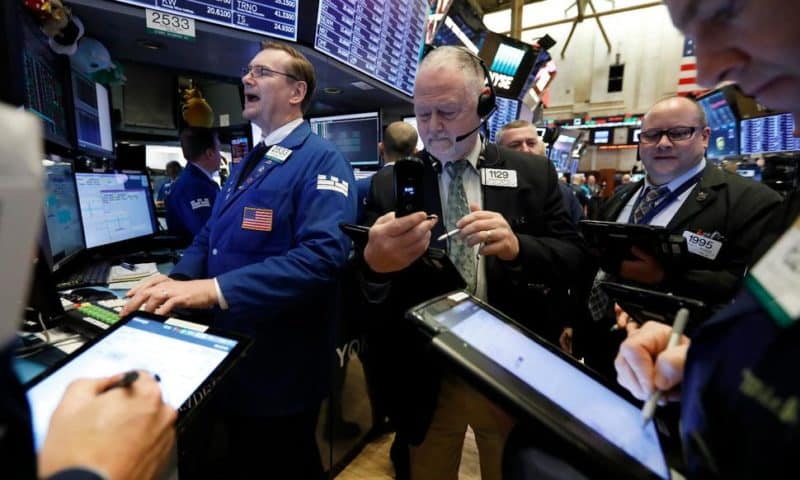Stocks closed higher on Wall Street Wednesday as solid gains by technology companies helped the market recoup some of its losses from a day earlier.
Stocks closed higher on Wall Street Wednesday as solid gains by technology companies helped the market recoup some of its losses from a day earlier.
Small-company stocks also stood out, beating the rest of the market. Banks, retailers and homebuilders also notched gains. Utilities were the biggest laggard.
Investors appeared to welcome new insights from the Federal Reserve’s last meeting of policymakers. The central bank released the minutes from the two-day March meeting, which showed that a majority of Fed officials believed the central bank could keep interest rates unchanged the rest of this year.
The rally was a reversal for the market following a slide on Tuesday that ended an eight-day winning streak as investors turned their attention to the next wave of corporate earnings.
“It was just a little bit of an overreaction yesterday,” said Karyn Cavanaugh, senior markets strategist at Voya Investment Management. “This is a little bit of an uneasy period because we’re waiting for earnings to start.”
The S&P 500 index rose 10.01 points, or 0.3%, to 2,888.21.
The 30-stock Dow Jones Industrial Average recovered from an early slide to gain 6.58 points, or less than 0.1%, to 26,157.16.
The Nasdaq, which is heavily weighted with technology stocks, added 54.97 points, or 0.7%, to 7,964.24.
Small-company stocks, which investors tend to favor when they’re feeling bullish about the economy, rose more than the rest of the market. The Russell 2000 picked up 21.87 points, or 1.4%, to 1,581.55.
Major indexes in Europe finished mostly higher.
Despite a downturn in stocks on Tuesday, the broader market has been steadily gaining in 2019. The S&P 500 is up 15.2% for the year.
Bond prices rose, sending yields lower, after the government reported that a key measure of consumer price inflation remained in check last month. The yield on the 10-year Treasury note, which is used to set interest rates on mortgages and many other kinds of loans, fell to 2.47% from 2.50% late Tuesday.
Traders turned their attention Wednesday to corporate earnings, as Delta Air Lines kicked off the first-quarter earnings reporting season. The company’s results easily beat forecasts, sending its shares and those of other big airlines higher.
Levi Strauss also gained 4% after swinging to a quarterly profit in its first period since becoming a publicly traded company again.
Analysts expect first-quarter earnings for the S&P 500 index to contract for the first time in nearly three years and are closely tracking forecasts for the remainder of the 2019.
“Earnings are going to really be the barometer for what’s going on with global growth,” Cavanaugh said. “A lot of people are expecting negative earnings growth. I think we’re going to be positively surprised, and that will help investors feel a little bit more at ease.”
Investors also pored over the latest Fed meeting minutes, looking for clues that might signal the central bank’s next move on interest rates.
The minutes showed that a majority of Fed officials last month believed that economic conditions would likely warrant keeping the Fed’s benchmark policy unchanged for the rest of this year. Several officials said their view could shift in either direction based on incoming data, according to minutes of the meeting.
At the meeting, the Fed left its key policy rate unchanged and trimmed its rate hikes outlook this year from two to none. Some economists believe the Fed could actually start cutting rates later this year if the economy slows further.
Weaker growth and lower inflation expectations could prompt the Fed to cut rates, while faster growth and rising inflation expectations could prompt it to resume raising rates.
“This is a data-dependent Fed, and that’s very positive and very good,” said Tony Roth, chief investment officer at Wilmington Trust.
Meanwhile, the European Central Bank left its policy goals and interest rates unchanged Wednesday as it weighs looming risks to the region’s economy from trade disputes.
Technology stocks led the market higher Wednesday. Chipmaker Advanced Micro Devices rose 2.2%.
Financial companies also notched gains. Invesco climbed 2.4% and Goldman Sachs Group rose 1.2%.
Delta Air Lines shares lifted off after it gave investors a better than-expected quarterly report and forecast. The stock jumped as much as 2% before giving up some of its early gains. It shares gained 1.6%.
Shares in other airlines also rose. American Airlines Group gained 2.1% and Southwest Airlines added 1.4%.
Not all corporate report cards were encouraging.
WD-40, which makes the popular lubricant for home and industrial uses, fell 5.1% after its fiscal second-quarter revenue fell short of Wall Street forecasts.
Lyft tumbled 10.9%, adding to a string of losses since the ride-hailing service made its stock market debut on March 29. The latest slide in the stock, which is now 16.5% below Lyft’s IPO price, comes as rival Uber is reportedly close to filing paperwork ahead of its own IPO.
Energy futures ended mostly higher. Benchmark U.S. crude rose 1% to settle at $64.61 a barrel. Brent crude gained 1.6% to close at $71.73 a barrel.
Wholesale gasoline climbed 3.5% to $2.07 a gallon, heating oil picked up 2.1% to $2.09 a gallon and natural gas was little changed at $2.70 per 1,000 cubic feet.
The dollar fell to 110.96 yen from 111.11 yen on Tuesday. The euro strengthened to $1.1271 from $1.1267.
Gold rose 0.4% to $1,313.90 an ounce, silver added 0.2% to $15.24 an ounce and copper dropped 0.3% to $2.93 a pound.

